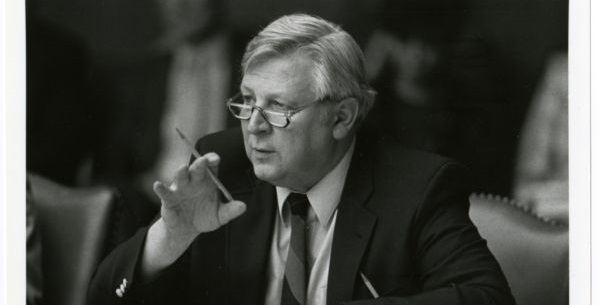Carl Kroening loved to handicap the races, to absorb himself in the Daily Racing Form and the past performances of horses on a given card. He enjoyed assembling the many elements and constituents of a race in an effort to extract a winner.
That didn’t surprise most of his friends, certainly not those who knew him well. After all, Kroening was a chemistry teacher in the Minneapolis Public School system. If he loved taking apart the elements of matter and teaching that to his students, why wouldn’t he enjoy doing something similar in a recreational atmosphere, that of trying to beat the horses.
Kroening was also a state legislator who was in the vanguard of the effort that brought pari-mutuel racing to Minnesota. In the years that followed he worked on bills that supported the efforts and needs of Canterbury Downs/Park. He possessed a megaphone for a voice and used that powerful mouthpiece to champion racing and related elements to the sport in the legislature.
And more often than not, he was at the racetrack on a weekend with friends, handicapping and wagering on the races.
Kroening, 89, died on June 29 and services were held at St. Austin’s Catholic Church in North Minneapolis on July 11. He is survived by six daughters and his former wife, Ruth.
Aside from family, Kroening’s devotions in life were to education, golf and horse racing. An article in the Minneapolis Star-Tribune described him as “a powerful voice for education and protector of the North Side.” There is also little doubt about his importance in racing legislation. There is disagreement however on the results of his handicapping.
Canterbury lobbyist Ron Jerich had numerous interactions with Kroening over the years. “He was an unbelievable handicapper,” said Jerich. “He was a two-dollar bettor but he always walked away with twenty to thirty dollars.”
That assessment differs from the observations of long-time friend Chuck Swanson, who accompanied Kroening to Canterbury frequently.
“He loved horse racing and knew everything about it, but he couldn’t pick a winner,” Swanson said.
What Kroening’s friends do agree upon is that he was a force for racing in Minnesota, that he was at the center of nearly every effort to assist the sport and the racetrack in the legislature.
“He helped get the racetrack on board and he got things done,” said Jerich. “He was the precipitating factor. He worked on all kinds of bills.”
Jerich recalled that in the early 1980s Kroening worked almost exclusively on the pari-mutuel bills. “He became interested in it (racing) and worked the hell out of it,” Jerich added.
Kroening was graduated from John Marshall High School and earned undergraduate and graduate degrees in chemistry and educational administration at the University of Minnesota. He taught at John Marshall High and at North High in Minneapolis and was an assistant principal at several Minneapolis schools.
He was a Master Sergeant in the U.S. Army and served in the Korean war. He represented North Minneapolis in the State House of Representatives from 1975 to 1981 and as a state senator from 1981 to 1997.
Swanson said that he knew Kroening for 50 years or more and that he talked to him every morning at 7 a.m. “He was in assisted living in Northeast Minneapolis for the last couple of years,” Swanson said. “He’s going to be missed by a lot of people.”
Swanson, soon to be 91, described Kroening as “very intelligent, a strong individual and an excellent teacher.” At the same time he thought his friend could be a little too “opinionated” at times.
He said that Kroening was always reading something but that his reading material wasn’t always what it appeared to be. “You’d think he was reading a bill but he was really reading the Racing Form. And he had the ability to ignore you at times.”
As much as he accomplished for his constituents in Minneapolis, Kroening did every bit as much for racing, something his friends and others who never met him enjoy as beneficiaries of the work that not only brought racing to Minnesota but helped prop it up during some troubled years.
“He was a strong supporter of Canterbury,” Swanson said. ” We were lucky to have him around as long as we did.”
JIM WELLS
